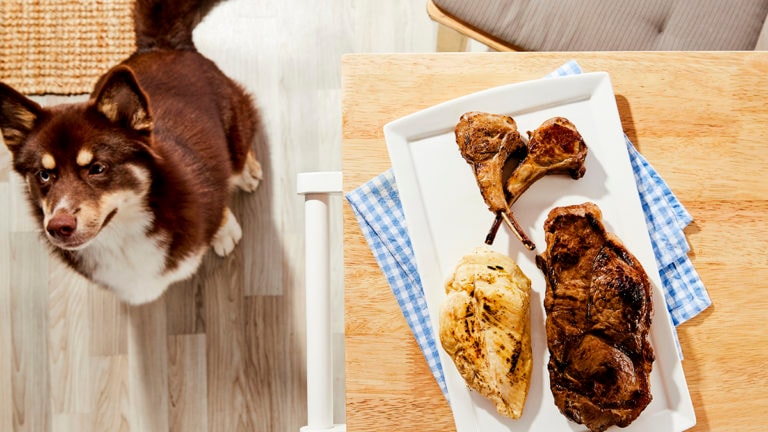You know that getting enough protein is part of eating a well-balanced diet for humans. But did you know the same applies to your dog?
When you feed your dog the proper amount and type of protein, they can make and maintain all the protein-containing tissues and molecules in their body, which include muscle, skin, hair, antibodies, and hormones, explains Jennifer Coates, DVM, a veterinary consultant in Fort Collins, Colorado.
So, how much protein does your dog need to reap these benefits? Would a high-protein dog food be the answer?
Every dog’s dietary needs are unique. Because of this, Dr. Coates stresses that your veterinarian is your go-to authority when determining which dog food is best for your specific dog. That said, in general, Dr. Coates says three types of dogs usually need a high-protein dog food highly active dogs (such as working dogs or agility dogs), certain puppy breeds, and some senior dogs with muscle wasting.
Highly Active Dogs

If you have a highly active dog—a working dog, a canine athlete, or an everyday trailblazer—a high-protein dog food can help “build the necessary muscles and repair them after an intense workout,” says Dr. Coates.
Higher protein levels also can be a source of energy for active dogs.
“Once all of a dog’s protein needs are met, excess protein gets converted into energy,” Dr. Coates adds.
When adult dogs are active, they experience protein turnover. The body builds up and breaks down muscle protein during and after exercise, so dogs rely on dietary protein to meet their metabolic needs. Active dogs who do not receive adequate dietary protein can become fatigued and suffer from muscle loss. If your dog isn’t exercising regularly, however, Dr. Coates warns that those extra calories from protein can get converted into fat.
For active dogs, try the high-protein Purina® Pro Plan® Sport Performance dog food. This AAFCO-balanced diet provides 30% protein and 20% fat to fuel metabolic needs and maintain healthy lean muscle. It also contains EPA, an omega-3 fatty acid, and glucosamine to help support healthy joints and mobility.
Or give the Eukanuba™ Premium Performance 30/20 Sport a shot. It’s formulated for sporting, tracking, and working dogs with a nutrient ratio of 30% protein and 20% fat.
Growing Puppies

Normal growth and development in puppies depend on many complex factors, adequate protein levels being one of them, Dr. Coates says. One of the reasons is simple: Muscles need protein to grow, and puppy muscles have a lot of growing to do.
Another reason why higher levels of protein might contribute to normal puppy growth is that, as Dr. Coates already pointed out, protein is essential to more than just muscle growth. Protein is a vital component in maintaining normal immune system function as well as healthy skin and coat.
Aside from puppies, Dr. Coates says that a high-protein dog food may also be necessary for pregnant or lactating pooches.
For dry puppy food, Hill’s® Science Diet® high-protein dry dog food for large breeds is a complete and balanced diet made from natural, high-quality ingredients and recommended for puppies up to 1 year of age. There’s also Eukanuba Premium Performance Pro Puppy dry food, which features optimal protein to help build and maintain muscle.
For wet food, the Purina® Pro Plan® high protein wet dog food boasts real chicken as the No. 1 ingredient and features brain-nourishing nutrients, including docosahexaenoic acid (DHA) for brain and vision development.
The Blue Buffalo™ Baby Blue™ Healthy Growth Formula puppy wet food is a high-protein, grain-free recipe you can feed as a complete and balanced meal or mix into dry kibble.
Senior Dogs

If a higher protein diet is healthy for growing pups, can it be healthy for older dogs, too? The answer is yes!
High-protein dog food can also benefit senior dogs because they can experience muscle wasting, which means they lose muscle mass with aging, Dr. Coates explains. Less muscle makes it harder for older dogs to stay active and healthy since muscles power activity and play.
While protein is essential for muscle growth, it also is needed to maintain muscle, Dr. Coates says. For these reasons, she encourages senior dog parents to consider high-protein dog food to keep pets at their best during their golden years.
Some older dogs have trouble metabolizing nutrients as they become older. Increased protein in their food can help boost their immune system, in addition to helping to prevent their muscles from wasting.
For wet food, which is great for senior dogs as the texture is easier to chew and the smell is more pungent, Hill’s Science Diet’s Adult 7+ canned dog food is formulated with high-quality, lean protein to promote lean muscle and help maintain a healthy weight. It’s also made with gentle fibers to promote digestive health.
Blue Buffalo Wilderness™ high-protein canned dog food a precise blend of nutrients and antioxidant-rich ingredients to support healthy immune system and overall wellness.
For kibble, Purina ONE® Vibrant Maturity® senior dog food helps support brain health in aging dogs to encourage cognitive wellness. Plus, its antioxidant blend helps support a healthy immune system, while omega fatty acids help maintain skin and coat health. The kibble is formulated for small breeds to large breed sizes.
Another option is the Blue Buffalo Wilderness Rocky Moutain Recipe™ senior dog food. This dog food features a balance of essential proteins and carbohydrates that helps provide senior dogs with the energy to stay active.
There are some exceptions, though. Dr. Coates says dogs who have been diagnosed with kidney or liver disorders should avoid high-protein dog food because higher protein levels might aggravate these conditions.
It’s best to check with your veterinarian to see if your senior dog is a good candidate for a high-protein diet.
There are many things to consider when looking for the best dog food for your canine companion. Of all the nutrients to think about, protein stands out as one you should keep an eye out for. And, according to veterinarians like Dr. Coates, when it comes to very active dogs, puppies and seniors, more protein can be a part of a healthy, balanced diet. Ask your vet for their advice before switching your dog’s food.
Expert input provided by Jennifer Coates, DVM, a veterinary consultant in Fort Collins, Colorado.
This content was medically reviewed by Chewy vets.
Share:



















